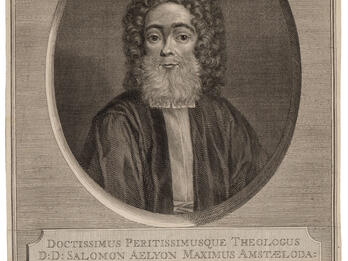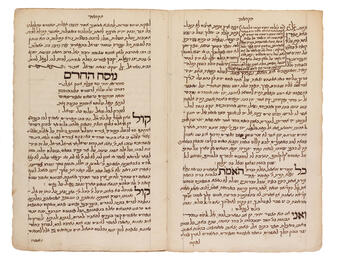Discourses on the Ecclesiastical and Civil Polity of the Jews
We have already said, that wheresoever a competent Number of those of our Nation, were settled into a standing Community, the first thing they took care of, was the Erection of a publick School. Now this according to the greater or lesser Number of those that were to be instructed, was always greater or lesser, and was to be maintain’d by a publick Fund settled for that Purpose.
These Orders are kept up under the Modern Constitution, with all possible Exactness and Fidelity; so that if any of the lesser Towns refuse to comply with them, the greater Cities have Power to excommunicate them, and never revoke their Sentence till they have forced them to it. And indeed such is the Strictness of our Modern Discipline in the Matter of Instruction and Education, that every Master of a Family, who cannot have the Advantage of a publick School, is oblig’d to maintain a Master at his own private Charges, till his Children be out of the lower Forms, and have by their Proficiency in Learning qualified themselves for the higher Schools. For the due ordering of which Schools, and that they may answer the Design of their Institution, in being serviceable to the publick Necessities, Two of the Chief Men in every Synagogue, are appointed yearly about the Day of Pentecost, whose Business it is to take care of their respective Schools. To which end they oblige themselves once every Day to visit them, and to see that both Master and Scholars perform their respective Duties, and for the greater Encouragement of the latter, these Governours meet several Days before they proceed to a new Appointment, and publickly examin them, in which Examination, they that acquit themselves well, are publickly rewarded. The Governours are likewise to take Care that the Youth in the Synagogue perform their Devotion Solemnly and regularly, and have Power to correct any Party offending in this Kind, by suitable Punishments, tho’ gentle Methods are generally pursued, it being thought most agreable to treat Youth with Sweetness and a Kind of Condescension to their Weakness.
Next to the Governours, ’tis not improper to consider Masters of Schools, and what Qualifications were requisite for their Charge. Concerning them therefore we may observe, that it is required, not only that they should be Persons of good Parts and intellectual Abilities, but likewise that they should be of known Probity and Integrity; that so their Lives comporting with their Doctrine, they might be able to instruct both by Precept and Example. Also ’tis requir’d that they should not use Severity, nor indeed any rough Methods of Correction, unless where they are altogether necessary, and that only for a Terrour to others, not to gratifie their own Hatred, or any other indecent Passion. As to the Scholars, it is expected from, and required in them, that they should be of an humble and docible Disposition; that they should behave themselves with Modesty and an agreeable Reverance to their Teachers; and be every Way qualified by Virtue and good Manners to reap the Benefits of the Instruction, neither following the Bent of their Passions, nor addicted to any vitious Pursuits; the Master being obliged to fortifie their Minds with honest and laudable Dispositions against all such Impressions; And if either for want of natural Sagacity or sufficient Industry any one is found incapable of rising to a sufficient Pitch of Learning, he is took off from his Studies and obliged to betake himself some meaner employment, it being thought inconsistent with the Honour and Dignity of the Law to be handled by Persons of mean Abilities. ’Tis a Rule with us, that no Child be admitted into our publick Schools under six Years of Age, and some, not before they are seven; a just and due Regard being always had to the Vigour or Weakness of their Constitutions; and then after they have been accustomed to some principal Texts of the Law (as viz. Hear O Israel the Lord our God is one Lord, etc.) by their Parents Care over them, so as to be able upon Occasion, readily to account for them. Upon their first Admission, they are to be instructed in the Law of Moses, to be taught the Text and Historical Passages of it, together with the Writings of the Prophets, it being thought most proper, that their first Advances in Learning should be bottom’d upon the same Foundation with their Religion, that so both may grow up together. After this, they are to proceed to the Oral Law, or the Mishna, whereby they are to be instructed in the litteral Sense and meaning of the written Law; with the Text whereof they are already acquainted. Sometimes also for the Exercise of their Wit, and for Tryal of their Accuteness, the Masters use to propound Allegories and Parables to them, under, which, is always couched some pertinent and highly significant Piece of Knowledge, and oblige them to find out the Allusion. This Method of Instruction, has been all a long practiced by Philosophers and Poets, especially in the Eastern Parts of the World, as History does abundantly inform us. After they have made an agreeable Proficiency in these Studies, they advance to Logick, thereby to qualifie themselves for the due Exercise of their Reason, in discerning the proper Consequences of Things from their immediate or remote Principles, in forming a true Judgment of their Connexion or Disagreement, and thereby fortifying their Minds against Erroneous and Sophistical impressions. Their Judgments being thus settled, and by Age and Experience sufficiently matur’d, they betake themselves to the higher Forms, and apply themselves to Natural Philosophy, and some Part of the Mathematical Science, and lastly, (if their Inclinations will carry them so far) to Metaphysicks; in a Word to every Part of useful Knowledge. However, there are not many that arrive to these Heights: As to Natural Philosophy, this is to be learned from the 1st Chap. of Gen. upon which Account it is called the Study of the Work of the Creation, which being incumbred with great Difficulties is not wont to be publickly explained, but only in private to the Party that desired it. As for Metaphysicks, neither is this Study to be otherwise attained to, it being grounded upon the first Chap. of Ezekiel, which is looked upon as no less Difficult, and therefore not to be explained but with the like Caution.
The Number of Scholars under the Care of one Master, is 25, and this compleateth a School: But, if the Number increase to forty, then the Master is oblig’d to take an Assistant; to the End they may be more carefully educated. If they exceed this last Number, either another Master is to be appointed in the same School, or else another School is erected. This is to be understood of the younger Sort, whose tenders Years require that an extraordinary Care and Diligence should be used towards them. Otherwise, and in our greater Schools, the Number of Students is not precisely determinable; they amounting sometimes to 3 or 400 and may be more or less, according as the Places where the respective Schools are situated, are more or less Populous. In these the Masters read in Quality of Professors, and therefore address themselves to all their Auditors at once, and consequently there is no need, as in those of the lower Forms, of a particular Application. In this also the Master is placed in a Chair on an Eminence above his Auditors, who are seated round about him and receive his Doctrine with all possible Attention. They have the Liberty to put what Questions they please to him, if they arise out of the Subject of his Discourse, (otherwise they are not allowed to speak) and that to be done orderly one by one. There is also an Interpreter appointed, who is to repeat what the Master delivers for the Benefit and Instruction of those, that are at so great a Distance, that they cannot hear with sufficient Advantage. Sometimes the Master proposes a Piece of Sophistry with Design to exercise the Skill of his Auditors, by trying whether they discover it to be such or not. The Scholars of inferiour Rank are constantly kept to Duty; only they are allowed a Liberty on the Eves of the Sabbaths and other Festivals, on the former whereof they have no new Lesson, but are oblig’d to a Repetition of what they had learned all the Week before.
Credits
Published in: The Posen Library of Jewish Culture and Civilization, vol. 5.




